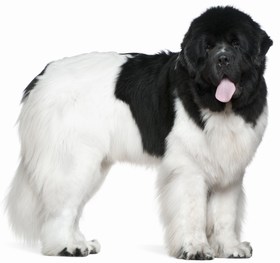
Paws ‘N’ Pups Quickview
Size
| Energy Level
| Trainability
| Paws ‘N’ Pups Rank
|
Characteristics
| Physical Characteristics: Height: 24-30” Weight: 110-200 lbs. Energy Level: Low – Moderate | Colors: The Saint Berdoodle is found in the following colors:
|
Health & Longevity
Average Life Span: 8-12 years
The Saint Berdoodle is a hybrid cross between the Poodle and the Saint Bernard, and it is one of the largest mixed breeds in the world. Like all hybrid breeds, the Saint Berdoodle is less prone to hereditary health issues than his purebred counterparts, but there is still a possibility that he can inherit health problems common to either parent breed. He is also prone to health problems that are associated with giant breeds.
The Saint Berdoodle may experience joint dysplasia and patellar luxation. Joint dysplasia occurs when malformed joints result in pain, discomfort, and limping. In more severe cases, arthritis or even lameness can result, and surgery may be required. Dogs with joint dysplasia generally should not breed, so ensure that your potential puppy’s parents have no history of these conditions, particularly hip dysplasia. Patellar luxation refers to the knee joint sliding easily into and out of place, resulting in frequent dislocation of the kneecap. This results in pain and sometimes limping, as well as lameness that is often intermittent. Although surgery can correct patellar luxation in some cases, it is not always a possibility.
Hypothyroidism is a thyroid condition that occurs when the thyroid gland does not produce sufficient amounts of hormone, and it can lead to health problems such as infertility, obesity, lethargy, and hair loss. It is treatable, but the affected dog will need to take daily medication for the duration of his life.
Bloat may occur in some Saint Berdoodles. Bloat is caused by the stomach becoming overly full of gas, food, or fluid, resulting in dangerous expansion and causing the stomach to put excess pressure on surrounding organs. In some cases, the stomach also twists, trapping blood and preventing it from flowing to the heart and other vital areas. Bloat can be deadly, so take your Saint Berdoodle to the veterinarian immediately if you notice symptoms such as pale gums, excessive drooling, failed attempts to vomit, or a swollen stomach.
A blood clotting disorder known as Von Willebrand’s disease may impact some Saint Berdoodles. Von Willebrand’s disease is the result of insufficient amounts of Von Willebrand’s factor, which aids in blood clotting. This can lead to excessive and uncontrollable bleeding, sometimes even from minor wounds, and blood transfusions may be required.
The Saint Berdoodle may also experience heart problems, allergies and skin problems, and eye issues. He may be prone to ear infections.
The average lifespan for the Saint Berdoodle is 8-12 years.
Temperament & Train-ability
Although the temperament of mixed breed dogs can vary, the average Saint Berdoodle is loving, affectionate, friendly, and intelligent. He loves to relax but can also be a fun and playful family companion who wants to be the center of attention as often as possible.
The Saint Berdoodle is a giant breed who needs plenty of space. Although he has only moderate exercise needs, he is ill-suited for an apartment due to his size. Take the Saint Berdoodle for a few brisk walks each day, and give him opportunities to run and play in a securely fenced yard. The Saint Berdoodle does not have a lot of stamina, so don’t expect him to be a good companion for hikes or jogs. Although he does need a lot of space, it is best for the Saint Berdoodle to live indoors, because he loves spending time with his family. He is an extremely affectionate and very sweet dog who does not like to be left alone for long periods of time. If he is not receiving enough human interaction, he can become destructive, and he can cause a lot of damage due to his size.
The Saint Berdoodle can be excellent with children, but children should be taught how to properly play with and approach the dog. Supervising him around smaller or younger children is recommended, as he may accidentally knock them over or injure them. He gets along well with dogs and other pets as well, and early socialization can help ensure this appropriate behavior. He is cautious and somewhat suspicious of strangers. This makes him a good watchdog because he will bark to alert his family of intruders. He can also be utilized as a guard dog because he is protective of his family, and his size can be intimidating. Although the Saint Berdoodle does have a loud, deep bark, he uses it only rarely.
The Saint Berdoodle is an intelligent dog who wants to please his owner, which can be helpful when training him. He can be motivated with positive reinforcement such as favorite treats and encouraging praise. Despite his size, he is a very sensitive dog, so do not be harsh during training. However, the Saint Berdoodle may use his size to try to dominate, so be sure to be firm and consistent. Early training is important to ensure that you are able to manage this breed’s massive size. Leash training is especially crucial.
Grooming
The Saint Berdoodle is typically low shedding like the Poodle, but daily brushing is still recommended to prevent tangles and matting. In some cases, he may inherit the St. Bernard’s coat and shed more.
Bathe the Saint Berdoodle as needed. Trim his nails regularly to prevent overgrowth and cracking. The Saint Berdoodle can be prone to ear infections, so be sure to check his ears weekly for signs of infection such as redness, tenderness, odor, and excess buildup of wax, dirt, or debris. It may also be wise to clean his ears with a veterinarian recommended cleanser. Brush his teeth at least 2-3 times weekly to prevent bad breath and maintain good overall health.
Diet
The average Saint Berdoodle should consume 4.5-6 cups of high quality dry dog food daily. Split his food into at least two meals each day, and monitor his weight and food intake, because he does have a tendency to become overweight.
Take precautions against bloat by ensuring that he does not eat too rapidly, preventing him from drinking excessive amounts of water just before or just after eating, and imposing a one hour waiting period between eating and exercising
Looking for a Saint Berdoodle?
 Find A Saint Berdoodle Breeder |  Saint Berdoodle Puppies For Sale |  Adopt A Saint Berdoodle |
Cost
The cost of a Saint Berdoodle varies widely, with prices ranging from $500-$2000. Prices can vary according to factors such as breeder location and reputation, puppy pedigree, and gender.
If you find a Saint Berdoodle to adopt, expect to pay up to $175 in adoption fees, depending on your location.
Paws ‘N’ Pups Ranking
Paws ‘N’ Pups ranks every breed out of 4 with 1 being easiest to integrate into your life and 4 being the toughest – The lower the ranking the better.
Ranking takes into account a few basic factors including cost, skill level needed, high vs low maintenance and how critical regular training is to success. The Saint Berdoodle ranks a 3. Although he is a loving dog who can get along well with most people and pets, he requires a great deal of attention and has a fairly high-maintenance coat. Additionally, his size creates unique challenges in regards to bathing, going for walks, training, and more. The Saint Berdoodle can be a good choice for an owner who is prepared to deal with a dog of this size or has experience with giant breeds.
Breeds Similar To Saint Berdoodle
 Saint Bernard |  Poodle |  Newfoundland |  Bernese Mountain Dog |




